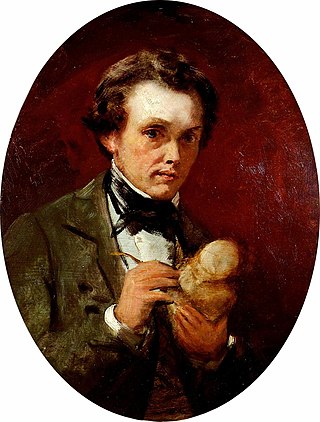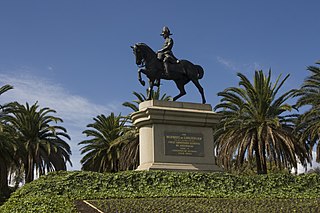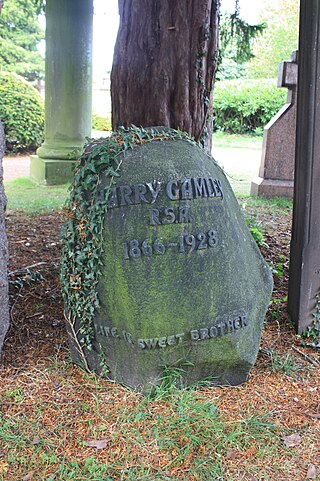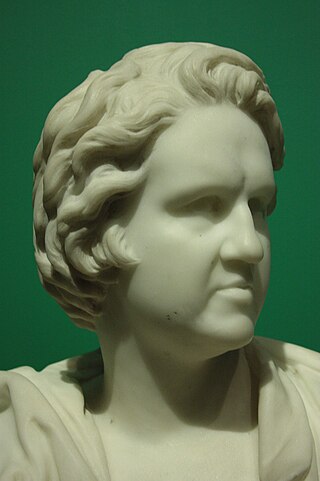
The Royal Scottish Academy (RSA) is the country’s national academy of art. It promotes contemporary Scottish art.
Alexander Carrick was a Scottish sculptor. He was one of Scotland's leading monumental sculptors of the early part of the 20th century. He was responsible for many architectural and ecclesiastical works as well as many war memorials executed in the period following World War I. As head of sculpture at Edinburgh College of Art, and as a leading member of the Royal Scottish Academy, Carrick had a lasting influence on Scottish sculpture.

William Brodie was a Scottish sculptor who worked in Edinburgh.

William Birnie Rhind RSA (1853–1933) was a Scottish sculptor.

Ann Henderson was a Scottish sculptor born in Thurso, Caithness, Scotland. Henderson taught sculpture at the Edinburgh College of Art for almost twenty years and was elected a member of the Royal Scottish Academy in 1973.

William Lamb RSA was a British sculptor and artist. He was a survivor of the "lost generation" who came of age in 1914, and was scarred, both mentally and physically, by the First World War.

Henry Snell Gamley (1865–1928) was a Scottish sculptor specialising in war memorials and sculpture on tombs. He was however also responsible for other figurative sculpture on prominent Edinburgh buildings such as the Usher Hall and works at Holyrood Palace.

John Hutchison was a Scottish sculptor based in Edinburgh. He was the son of an unnamed builder, and his artistic life began as a thirteen-year-old woodcarving apprentice. He attended art school in the evenings, then later became a student at the Trustees Academy. and attracted the patronage of its owner, Patrick Allan Fraser, who gave him commissions to fund his study in Rome. Although after Rome he continued to enjoy ancient Roman sculptural themes, he remained in Edinburgh for the rest of his life, working in wood, clay and marble, and concentrating on portraiture of Scottish people, and images of Scottish myth and history. He created the bust of Sir Walter Scott in Poets' Corner in Westminster Abbey. He was a successful artist who received commissions from Queen Victoria.

John Stevenson Rhind was a Scottish sculptor based in Edinburgh.
Emma Smith Gillies (1900–1936) was a Scottish potter best known for her early adaptation of Art Deco painted vases and jugs.
John Marshall (1888–1952) was a Scottish sculptor active in the early 20th century. He is noted for doing much of his architectural work in-situ, on the face of the buildings.

Robert Gemmell Hutchison RSA RSW (1855–1936) was a Scottish landscape artist, specialising in coastal scenes. He belongs to the school of British Impressionism.

Elizabeth Strachan Dempster, ARSA, was a Scottish sculptor.

Scott Sutherland was a Scottish sculptor, best known for the Commando Memorial in Spean Bridge. He was Head of Sculpture at Duncan of Jordanstone College of Art
James Wallace Ferguson was a Scottish painter, born in Stirling, and resident in Glasgow for most of his life. He went to the Glasgow School of Art before the First World War. He won the Guthrie Award in 1923 for young artists of the Royal Scottish Academy. He became the President of the Glasgow Art Club in the 1950s. He also was a Principal Lecturer in Art at Jordanhill Teacher Training College. He died in New Zealand while staying with his son.
The Guthrie Award is awarded annually with few exceptions to at most two recipients by the Royal Scottish Academy and is one of the most prestigious art awards in Scotland. It is named after the artist James Guthrie.
Laelia Armine Cockburn was a Scottish painter, born in Glencairn, Dumfries and Galloway. She won the Guthrie Award in 1925 with her work A Rough Lot For Sale.
Kate Campbell Muirhead was a Scottish sculptor, born in Perth. She won the first Guthrie Award in 1920 with her work, the portrait bust Elizabeth. As Muirhead got older she moved into painting rather than sculpture.
George William Salvesen was a Scottish sculptor, born in Helsinki, Finland. He was a joint winner of the fifth annual Guthrie Award in 1924 with his work, the sculpture The Dance.
The Society of Eight was an artistic grouping of Scottish painters. The Society set up its own gallery space in Edinburgh to exhibit their work. It was founded in 1912 and last exhibited in 1938. The Society did not reform after the Second World War.










